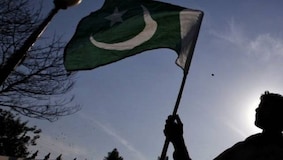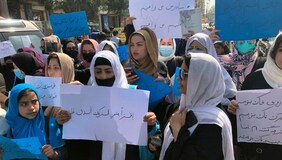Warm ties with India and vision beyond Kashmir: What Pakistan needs to battle economic crisis and global isolation
The political turmoil within Pakistan prevents it from approaching India for assistance, even when it faces disasters of epic proportions

Pakistan is facing a severe economic crisis. Reuters
It has been over two years since the Indian and Pakistani Director General Military Operations agreed to a ceasefire along the LoC and surprisingly it has held. The scenario in Kashmir has since then moved towards normalcy such that the government is considering handing over counter-insurgency responsibility to the CRPF. India has also issued a notice to Pakistan on the reassessment of the Indus Water Treaty (IWT), over which a response is awaited. While India remains stable and projects itself on the global stage, Pakistan struggles to survive facing internal insecurity, economic and political unrest.
Many of Pakistan’s elite have suggested that the nation look beyond Kashmir as it is out of Pakistan’s reach. They have suggested that if Pakistan is to grow then it needs to end enmity with India. Air Vice Marshal Shahzad Chaudhry (Retired) writing for Pakistan’sTribunestated, “Pakistan has been skilfully reduced to a footnote in this Indian script. It is time to smell some real leaves.” He added, “India has broken free of the shackles that kept her tied in South Asia and hyphenated in global perception with Pakistan.” He was criticized for writing reality.
Hussain Haqqani writing for the Hudson Institute states, “Considering some militants as instruments of regional influence while fighting others has disastrous consequences. Militancy and foreign sanctions resulting from terrorist financing has made it difficult for Pakistan to attract investment. More than 8000 members of Pakistan’s armed forces have lost their lives in terrorist incidents since 2000.” He adds, “Islamabad must change its tack if it hopes to prevent a full-blown insurgency and recover its global standing.”
Related Articles
The political turmoil within Pakistan prevents it from approaching India for assistance, even when it faces disasters of epic proportions. Currently, it needs a bailout solely to survive. Sri Lanka was in a similar boat recently. However, India came forward to help. Its foreign minister, Ali Sabry, tweeted in January, when Jaishankar visited Columbo, “I thank India for the generous support of the USD 3.9 Billion credit line last year and the assurances given to the IMF to restructure the debt. Sri Lanka is fortunate to have caring and considerate friends.”
Speaking to the press recently, Sabry stated on problems faced with the IMF, “There was a stalemate for a long period of time and then India came forward and gave the assurances the way IMF wanted.” India giving an assurance forced China to follow suit, opening doors for Sri Lanka to gain a bailout.
Pakistan is facing similar pressures from the IMF. The IMF has sought guarantees on restructuring Pakistan’s loans from China, which continues to hesitate as it did in the case of Sri Lanka. Simultaneously, Pakistan has been forced to import wheat from Russia at far higher rates only because of its hesitation to trade with India due to differences over Kashmir. The IMF has insisted that Pakistan cut its defence expenditure, high on account of its obsession with Kashmir, and reduce its armed forces strength, apart from other actions including stopping subsidiaries to enable the release of funds. It hinted that Pakistan should look beyond Kashmir and seek peace with India.
While India has stabilized Kashmir, Pakistan’s internal security issues worsens along its western periphery. To add pressure on Pakistan, India is exploiting the IWT. The Kashmir issue holds significant importance for Pakistan as it is closely linked with its water resources. The ongoing dispute with India could potentially exacerbate Pakistan’s water concerns, despite the existing treaty between the two countries. Pakistan faces droughts and floods repeatedly and would benefit in case both nations worked together to manage the flow of waters along major rivers emanating from Kashmir.
Floods in 2014 in large parts of Pakistan’s Punjab were blamed on India. Pakistanis believed it to be a water war launched by India, ignoring the fact that the country lacks water management. Resolution on water issues is only possible in case Pakistan gives up its obsession on Kashmir.
Indian leaders ignore Pakistan in their discussions abroad while Pakistan diplomats mention Kashmir in every discussion, even if the topic under debate has no link, compelling their Indian counterparts to respond. India exploited its UNSC tenure to put brakes on Pakistan’s support to terrorist groups, forcing it to recalibrate its policies. Pakistan’s period in the FATF Grey List only added to its financial woes, which are presented at the peak.
The gravest error Pakistan made was backing the Taliban against NATO in Afghanistan. During NATO’s deployment, Pakistan was a frontline state whose concerns were given an ear. It was India which was ignored. Pakistan falsely believed that the Taliban would be subservient to it and reign in the TTP (Tehreek-e-Taliban Pakistan) while providing it strategic depth and reducing Indian influence. It did not happen however, Pakistan ended up as a non-entity on the global stage while India rose in prominence. With the western withdrawal, Pakistan was ignored and has since then struggled to find its voice and global place. Its obsession to curtail India backfired.
Many in India have suggested that the country support Pakistan in its moment of crisis. The government hesitates mainly due to Pakistan’s internal political dynamics. Taha Siddiqui wrote in 2019, “The path to true independence and progress lies through peaceful economic development, not though a perpetual wartime economy.” This is only possible if Pakistan moves beyond Kashmir.
迈克尔Kugelman在推特上发布他的谈话在衰退ntly concluded Karachi Literature Festival, “One of the most interesting moments was when I said that the time may come when Pakistan needs to look beyond the Kashmir issue and move on. Because nothing is likely to change. Many in the audience applauded.” It conveys that the elite in Pakistan understand reality but the political class, fighting for survival hesitates mainly due to vote banks.
印度经济飞速发展和军事power rising, Pakistan will soon not even exist in footnotes. The difference between the two nations is growing in geometric proportions and could result in Pakistan only clinging to illusions. Such has been the Indian confidence that it has sidestepped a corps from the IB with Pakistan to the LAC with China. Pakistan’s only option, as rightly stated by many analysts, is to resolve issues with India and seek peace. It must shift its emphasis from confrontation to reconciliation. Only then would Pakistan benefit from regional growth and overcome its financial mess.
The author is a former Indian Army officer, strategic analyst and columnist. Views expressed are personal.
Read all theLatest News,Trending News,Cricket News,Bollywood News,
India NewsandEntertainment Newshere. Follow us onFacebook,TwitterandInstagram.
also read

Kill the inflation beast with rate hikes: IMF urges to European central banks
The European Central Bank (ECB) as well as other other central banks in the region have since last year followed the US Federal Reserve in hiking interest rates to rein in inflation

UNSC unanimously condemns Taliban ban on Afghan women working for global agencies
The UNSC vote came days before a planned international meeting in Doha on May 1-2 on Afghanistan. UN Secretary-General Antonio Guterres will convene behind closed doors special envoys on Afghanistan from various countries to work on a unified approach to dealing with the Taliban

Pakistan govt cites possibility of war with India, urges Supreme Court to postpone elections
In its report to Pakistan’s Supreme Court, the defence ministry cited the possibility of a war with India. The ministry also feared a rise in the activities of the Indian spy agency R&AW and attacks by the Pakistani Taliban and Baloch groups if elections are held in Punjab and Khyber Pakhtunkhwa


